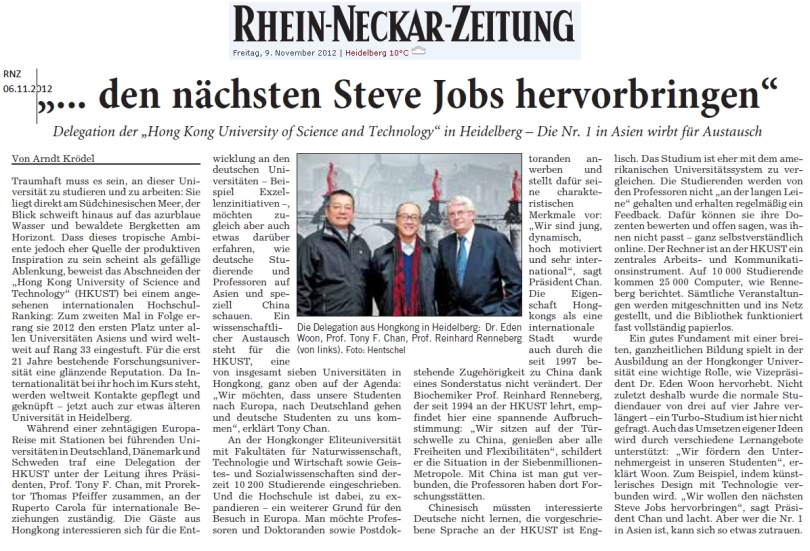
English translation
"We want to produce the next Steve Jobs"
A delegation from the Hong Hong University of Science and Technology, No. 1 in Asia, is looking for academic exchange
Arndt Krödel
It must be a dream to study and work at this university; It is situated directly on the South China Sea and the view looks onto across azure blue water onto wooded mountains on the horizon. This tropical ambience appears to be more of a source of productive inspiration than a pleasing diversion, as confirmed by the Hong Kong University of Science and Technology's success in the prestigious international university rankings: For the second year running it was ranked in first place among universities in Asia and 33rd place worldwide. This research university, which has only been in existence for 21 years, has a glowing reputation. Since internationalization is one of its top priorities, contacts are being cultivated and established all over the world - most recently with the somewhat older University of Heidelberg.
During a ten-day visit to Europe with stops at leading universities in Germany, Denmark and Sweden, a delegation from the Hong Kong University of Science and Technology, led by its president, Prof Tony F Chan, held meetings with Pro-rector Thomas Pfeiffer, who is in charge of international relations at Ruperto Carola. The visitors from Hong Kong are interested in recent developments at German universities such as the Excellence Initiative, but also wish to know more about how German students and professors regard Asia - and China in particular.
The elite institution in Hong Kong, which consists of four Schools, namely Science, Engineering, Business plus Humanities & Social Science, currently has 10,200 students. And the university is expanding, which is one of the reasons for the visit to Europe. It would like to attract professors and PhD students as well as post-doctoral students. As President Chan explains, "We are young, dynamic, ambitious and very international". Hong Kong's character as an international city has not changed since its sovereignty was returned to China in 1997, thanks to its status as a Special Administrative Region. The biochemist, Prof Rheinhard Renneberg, who has taught at HKUST since 1994, finds an exciting spirit of optimism in the metropolis, with its population of seven million: "We're sitting on China's doorstep, yet we enjoy complete freedom and flexibility." There are excellent connections with China and many professors have research teams there.
Germans who are intrerested in studying at HKUST are not required to learn Chinese, since the official language of the University is English. The degrees are more similar to those of American universities. The students are not kept on a "tight leash" and they receive regular feedback from their professors. In return, they have the opportunity to evaluate their professors and to say what they do not like - on-line, of course. At HKUST, communication and teaching are strongly supported by computers. According to Renneberg, there are 25,000 PCs for 10,000 students. All special events and lectures are edited and uploaded to the Intranet and the University Library operates almost entirely without paper.
Vice-President, Dr Eden Woon, points out that the University attaches special importance to providing a solid academic foundation, with a broad whole-person education. This is one of the reasons why the normal undergraduate degree has been extended from three to four years. Short cuts are not in demand. Degree programs encourage students to put their own ideas into practice and develop independent thinking. As Dr. Woon explains, "We try to develop an entrepreneurial spirit in our students, for example, by encouraging them to make connections between technology and creative design." "We want to produce the next Steve Jobs,"laughs President Chan. Yet, Asia's No 1 university may do just that. |
